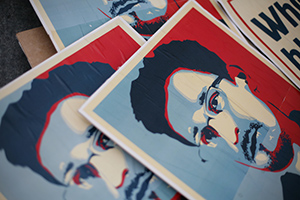“Citizen Four” Shows the Story Behind the Leak that Changed the World
Posted by: Dr Arne Hintz

The long-awaited documentary by filmmaker Laura Poitras about NSA whistleblower Edward Snowden had its UK premiere at the London BFI film festival on Friday 17th October. The impressive film portrays the man who opened our eyes to the pervasive mass surveillance by government agencies such as the NSA and GCHQ, but it also sheds light on the journalist operation that brought this sensitive information to the public, and it highlights the crucial role of whistleblowers, particularly in our current times of fear and the roll-back of rights and liberties.
The film has all the ingredients for a thriller. An intelligent and articulate whistleblower (Edward Snowden) who not only has insights into some of the most well-kept secrets of the world but also knows exactly what he is doing as he exposes them. A smart and dedicated journalist (Glenn Greenwald) who takes on most of the reporting and becomes, in the initial phase, the public face of the leaks. A filmmaker (Laura Poitras) who is a key part of the story. And a news organisation (The Guardian) that does not shy away from the risks and takes the media’s role as the Fourth Estate seriously. Add a few other renowned (and perhaps mysterious) personalities in the mix, such as Tor developer Jacob Applebaum and WikiLeaks founder Julian Assange, and the story becomes almost too good to be true. But this is what Laura Poitras manages to bring together in this film: The unbelievable extent of mass surveillance, the struggle between a few committed individuals and the most powerful governments of the world, and the personal stories of loss, separation, and uncertain futures.
And the shortcomings and failures. Half the film has already passed as we meet a human rights lawyer who starts to investigate solutions for Snowden himself who is, at that point, stranded in Hongkong and facing possible extradition to the US. Shortly after, we lose Snowden’s trace and the film focuses on how Greenwald, Poitras, the Guardian and other media continue the reporting. This is when WikiLeaks comes into the picture. Originally left out of the story, the whistleblower organisation helps Snowden leave Hongkong, explores possible safe havens, and then facilitates his temporary asylum in Russia. Its actions highlight the responsibility of reporters and media organisations to care for a source who has, in this case, given up everything. Asked about this in the Q&A after the film screening, Poitras noted that more thought should have gone into solutions for Snowden’s legal status and immediate future, but also pointed to the fast pace of events and the impossibility to plan and predict. Given this extraordinary context, Snowden agrees towards the end of the film that the whistleblowing “model” created here worked well and may motivate other leakers to come forward. The film ends with news about a new leaker who Greenwald is now working with.
The strength of the film lies partly in the tension between the focus on the protagonist and the issues that are reported. Several times, Snowden says he does not want to be at the centre of media reports, and he is concerned that the story he tells becomes overshadowed by an interest in his person. At the same time, he does not want to remain another ‘anonymous source’ but be open and accountable about his actions. His intention is to generate a public debate about surveillance and the power of security agencies, and it is only logical to him that he needs to reveal his identity in the process, whatever the consequences.
With its focus on the leaker and the journalistic operation, the film revisits key leaks almost in passing. But even the very incomplete account of the surveillance programmes reminds us of the incredible degree of mass spying and, moreover, the implications for freedom and democracy. The communication and interactions of entire populations are monitored, stored and analysed; this happens in complete secrecy, without us knowing what is monitored and how it is used, and often in violation of laws and constitutions; and the heads of security agencies lie to parliamentary commissions. And the film points out that the most extreme culprit is the UK. The Tempora programme by the GCHQ is so pervasive that “not even the Americans would do that”. Filmmaker Laura Poitras was only able to join the London premiere of her film on Skype, not in person. Whereas she had been able to travel to the US for her film premiere in New York the previous week, her lawyers advised her not to enter the UK, given the use of anti-terrorism legislation against journalists in this country. As Guardian journalist Ewen MacAskill said after the London premiere: “Laura Poitras can’t travel to Britain. That says a lot about the state of British democracy.”
